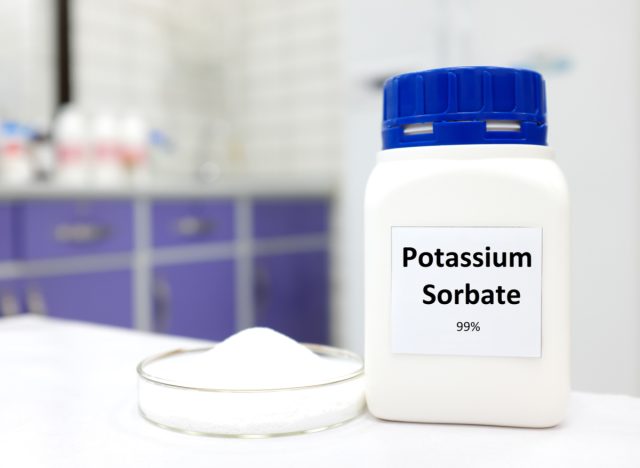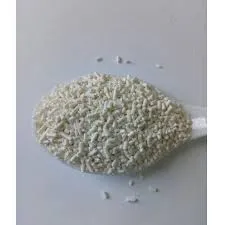
What Is Potassium Sorbate? And Why It's in Your Food
What Is Potassium Sorbate? And Why It's in Your Food
Potassium sorbate is acommon ingredientyou'll see on many food and beverage items throughout the grocery store. You might even see it listed in some of your favorite beauty products. And while "potassium" might be a recognizable term, the term "potassium sorbate" might not be quite as familiar to you—which makes you wonder what it is and whether or not it's actually agood idea to consume it. Find out more about this chemical compound when you keep reading and then read about morefood crimes we're talking about right now.
What is potassium sorbate?

Potassium sorbate is a chemical compoundof sorbic acid and potassium chloride. The compound is antimicrobial and made up ofunsaturated fatty acids, and it's found in many food products. It's oftenmade synthetically, though it was originally created from berries from an ash tree.
Potassium Sorbate
What does potassium sorbate do?
Potassium sorbate is used in foods primarily as a preservative. It can also be used in drinks and even personal care products. Potassium sorbate is primarily used tostop the growth of mold and fungus in your food. It has no color or smell, which makes it easy to blend into food products and beauty products. It won't affect how your food or drink tastes when it's included, it'll simply keep it from going bad too quickly.
Is it safe to consume potassium sorbate?
Though the idea of a chemical additive can be concerning, theFDA views potassium sorbate as generally safe. "This substance is generally recognized as safe when used in accordance with good manufacturing or feeding practice," the organization states on its website.
That being said, some people may prefer to not consume any substances that aren't naturally found in their foods, as there is always a potential for side effects. "Although the FDA states that potassium sorbate is generally recognized as safe (GRAS), it is still best to limit food additives that could possibly trigger an inflammatory response," says Alyssa Wilson, MS, RDN, LD, who is a metabolic success coach forSignos. "You can avoid potassium sorbate by reading the food ingredients label, limiting processed foods, and choosing to eat a whole-food,anti-inflammatory diet."
Studies have shown aconnection between some preservatives, including potassium sorbate, and inflammatory responses. While potassium sorbate generally passes through your digestive system without collecting, it could still trigger a side effect in some people. It's also possible to have an allergic reaction to potassium sorbate, though it's rare.
And because potassium sorbate can also be found in skincare products, it's worth noting that theEnvironmental Working Groupconsiders potassium sorbate to be low risk when it comes to irritation on the skin.
-
Essential Guide to Acetic Acid Food Preservative – Benefits, Uses & VendorsNewsNov.25,2025
-
Comprehensive Guide to Acetic Acid as Preservative: Benefits, Uses & Future TrendsNewsNov.24,2025
-
What Is a Food Additive? Global Insights, Applications & Future TrendsNewsNov.24,2025
-
968 Sweetener: The Modern Solution for Health-Conscious SweeteningNewsNov.23,2025
-
Discover the Benefits and Uses of 965 Sweetener (Erythritol) | Tenger ChemicalNewsNov.23,2025
-
961 Sweetener - A Next-Gen Sugar Alternative for Health and IndustryNewsNov.23,2025
-
Understanding 960 Sweetener: The Modern Sugar Alternative for Health and IndustryNewsNov.22,2025
Hebei Tenger Chemical Technology Co., Ltd. focuses on the chemical industry and is committed to the export service of chemical raw materials.
-

view more DiethanolisopropanolamineIn the ever-growing field of chemical solutions, diethanolisopropanolamine (DEIPA) stands out as a versatile and important compound. Due to its unique chemical structure and properties, DEIPA is of interest to various industries including construction, personal care, and agriculture. -

view more TriisopropanolamineTriisopropanolamine (TIPA) alkanol amine substance, is a kind of alcohol amine compound with amino and alcohol hydroxyl, and because of its molecules contains both amino and hydroxyl. -

view more Tetramethyl Thiuram DisulfideTetramethyl thiuram disulfide, also known as TMTD, is a white to light-yellow powder with a distinct sulfur-like odor. It is soluble in organic solvents such as benzene, acetone, and ethyl acetate, making it highly versatile for use in different formulations. TMTD is known for its excellent vulcanization acceleration properties, which makes it a key ingredient in the production of rubber products. Additionally, it acts as an effective fungicide and bactericide, making it valuable in agricultural applications. Its high purity and stability ensure consistent performance, making it a preferred choice for manufacturers across various industries.






